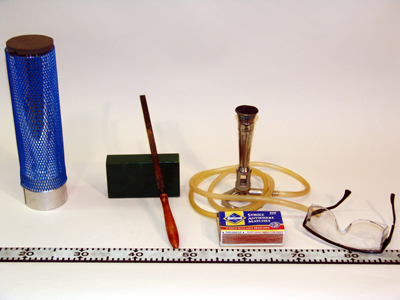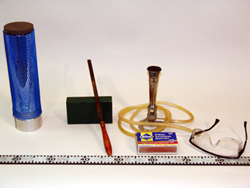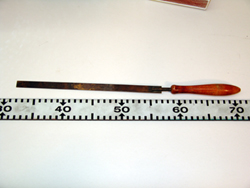|
Size: 1854
Comment:
|
Size: 1790
Comment: converted to 1.6 markup
|
| Deletions are marked like this. | Additions are marked like this. |
| Line 9: | Line 9: |
| (attachment photo showing the fully set up demonstration) | {{attachment:4A30-10a-01a.jpg}} |
| Line 17: | Line 17: |
| ||Bimetallic Strip||[:ThermoCabinetBayA3: TD, A3, Shelf #1]|| || | ||Bimetallic Strip||[[ThermoCabinetBayA3| TD, A3, Shelf #1]]|| || |
| Line 25: | Line 25: |
| Note: Make sure that one of the red & white gas cart are in placed and the gas hose is connected to the utility trench gas line. The gas cylinder that supplies the gas to utility trench gas line may or may not be connected/installed and should be inspected. |
|
| Line 27: | Line 29: |
| Note: Make sure that one of the red & white gas cart are in placed and the gas hose is connected to the utility trench gas line. The gas cylinder that supplies the gas to utility trench gas line may or may not be connected/installed and should be inspected. | |
| Line 34: | Line 35: |
| The bimetallic strip consists of brass and stainless steel. Since brass has higher thermal [http://en.wikipedia.org/wiki/Coefficient_of_thermal_expansion expansion coefficient] than stainless steel. When it is heated by the burner, it bends to the stainless steel side. On the other hand, placed it in liquid nitrogen (77K) the strip bends in opposite which is to the brass side. | The bimetallic strip consists of brass and stainless steel. Since brass has higher thermal [[http://en.wikipedia.org/wiki/Coefficient_of_thermal_expansion|expansion coefficient]] than stainless steel. When it is heated by the burner, it bends to the stainless steel side. On the other hand, placed it in liquid nitrogen (77K) the strip bends in opposite which is to the brass side. |
| Line 37: | Line 38: |
| ||attachment other photos||attachment other photos|| ||attachment other photos||attachment other photos|| |
||{{attachment:4A30-10a-01i.jpg}}||{{attachment:4A30-10a-03-250.jpg}}|| |
| Line 42: | Line 43: |
| 1. [http://hyperphysics.phy-astr.gsu.edu/hbase/thermo/bimetal.html Hyperphysics] | 1. [[http://hyperphysics.phy-astr.gsu.edu/hbase/thermo/bimetal.html|Hyperphysics]] |
| Line 44: | Line 45: |
| [:ThermalProperties:Thermal Properties of Matter] | [[ThermalProperties|Thermal Properties of Matter]] |
| Line 46: | Line 47: |
| [:Demonstrations:Demonstrations] | [[Demonstrations]] |
| Line 48: | Line 49: |
| [:Instructional:Home] | [[Instructional|Home]] |
Bimetallic Strip, 4A30.10a
Location:
Cabinet: Thermodynamics Cabinet
Bay: (A3)
Shelf: #1

Description:
Insert description of apparatus, its component, what it is demonstrating.
Equipment |
Location |
ID Number |
|
|
|
Bimetallic Strip |
|
|
Burner |
location |
NA |
Liquid nitrogen |
location |
NA |
Safety grove and glasses |
location |
NA |
Setup:
Note: Make sure that one of the red & white gas cart are in placed and the gas hose is connected to the utility trench gas line. The gas cylinder that supplies the gas to utility trench gas line may or may not be connected/installed and should be inspected.
- Make sure that you have all apparatuses in the table above.
Cautions, Warnings, or Safety Concerns:
- Beware of the burner and the liquid nitrogen.
Demonstration:
The bimetallic strip consists of brass and stainless steel. Since brass has higher thermal expansion coefficient than stainless steel. When it is heated by the burner, it bends to the stainless steel side. On the other hand, placed it in liquid nitrogen (77K) the strip bends in opposite which is to the brass side.
|
|
References:

